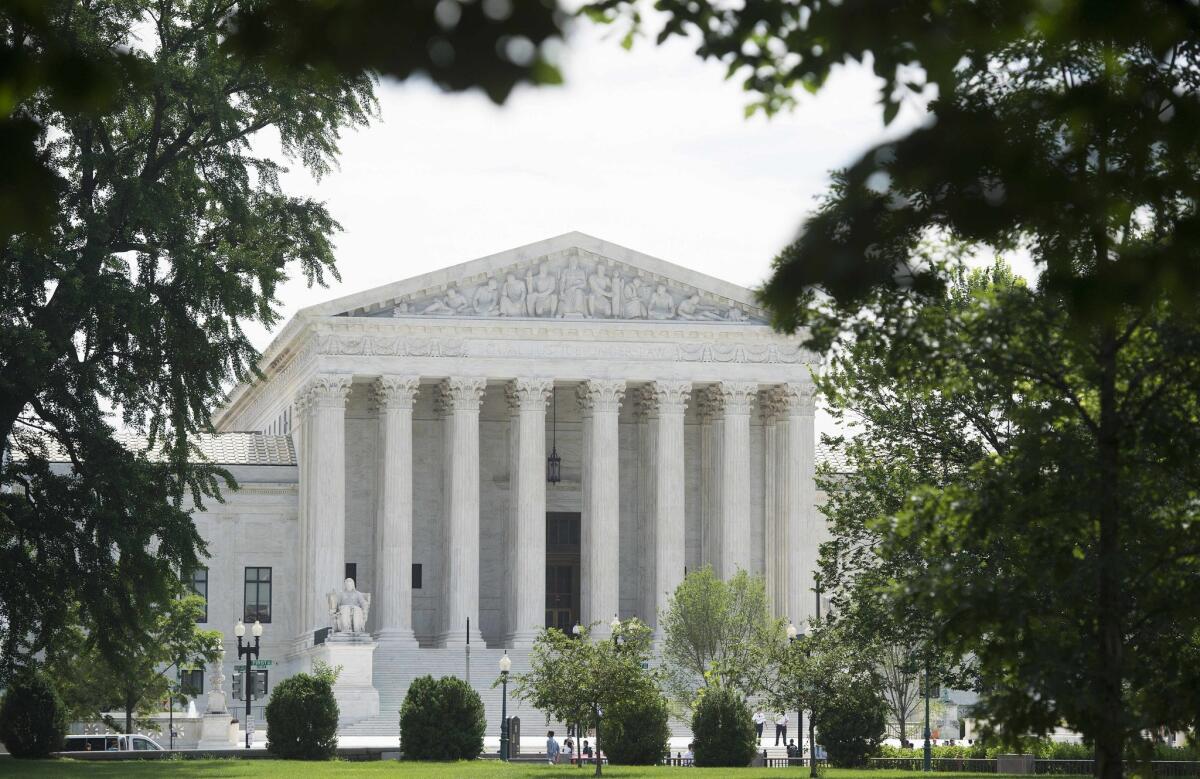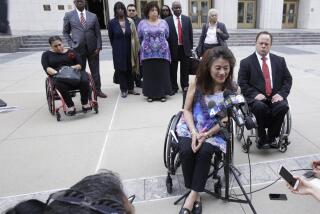Supreme Court upholds far-reaching rules against racial discrimination in housing

The U.S. Supreme Court building in Washington, D.C. The court upheld Thursday the reach of a federal law that forbids racial discrimination in housing.
Reporting from Washington — The Supreme Court on Thursday handed a rare victory to civil-rights advocates, endorsing a broad interpretation of a landmark 1960s-era law that forbids racial discrimination in housing.
In a 5-4 decision that at times recalled the rhetoric of the liberal Warren court, Justice Anthony Kennedy and the court’s liberal justices agreed that the 1968 Fair Housing Act covers discrimination regardless of whether it was caused by intentional and blatant racial bias.
The lawsuit challenged the construction of low-income housing predominantly in inner-city minority neighborhoods in Dallas rather than in white suburbs.
The justices said that under the law, discrimination can be shown even when there is no overt bias but when statistics prove that a particular practice or policy has had a “disparate impact” on minorities.
The decision was hailed by civil rights advocates as one that could finally undo decades of racial segregation.
“What is true in the Dallas area is true in every area of the country, which is that government practices confine people of color to underserved, violent neighborhoods with terrible schools where there are no jobs,” said Florence Roisman, a housing law expert who is on the board of the community group that brought the challenge. “It’s past time for that to stop.”
Ironically, the Obama administration and many of the civil rights groups that hailed Thursday’s decision had gone to great lengths to prevent the case from ever reaching the high court.
Labor Secretary Thomas Perez, when he was the top civil rights official in the Justice Department, brokered a deal for St. Paul, Minn., to drop a 2011 Supreme Court appeal because the Obama administration feared it would result in an unfavorable ruling. When a similar case came before the court two years later, it too was dropped out of concern that conservative Supreme Court justices might strike down “disparate impact” claims entirely.
The decision was a defeat for the mortgage banking industry. Several major banks had been sued by the Obama administration for lending practices that had a discriminatory effect on racial minorities.
In his opinion, Kennedy pointed out that the Fair Housing Act was passed by Congress in response to the assassination of Martin Luther King Jr. in 1968 and the social unrest that followed.
“Much progress remains to be made in our nation’s continuing struggle against racial isolation,” Kennedy said. He was joined by Justices Ruth Bader Ginsburg, Stephen G. Breyer, Elena Kagan and Sonia Sotomayor.
The Fair Housing Act “must play an important part in avoiding the ... grim prophecy that ‘[o]ur nation is moving toward two societies, one black, one white — separate and unequal,’ ” Kennedy wrote. “The Court acknowledges the Fair Housing Act’s continuing role in moving the nation toward a more integrated society.”
Justice Clarence Thomas, the court’s only African American and a former chairman of the Equal Employment Opportunity Commission, which enforces civil rights laws, wrote in dissent that the majority opinion was based on false assumptions.
“As best I can tell, the reason for this wholesale inversion of our law’s usual approach is the unstated — and unsubstantiated — assumption that, in the absence of discrimination, an institution’s racial makeup would mirror that of society,” Thomas wrote.
“But the absence of racial disparities in multiethnic societies has been the exception, not the rule,” Thomas said. “To presume that these and all other measurable disparities are products of racial discrimination is to ignore the complexities of human existence.”
In a separate dissent, joined by Thomas, Chief Justice John G. Roberts Jr. and Justice Antonin Scalia, Justice Samuel A. Alito Jr. argued that the Fair Housing Act “prohibits only disparate treatment, not disparate impact.”
He warned that the decision could have “unfortunate consequences,” because “even a city’s good-faith attempt to remedy deplorable housing conditions can be branded discriminatory.”
Roger Clegg, president of the conservative Center for Equal Opportunity in Virginia, had a similar reaction. “The Court’s decision is disappointing,” he said in a statement. “It fails to follow the clear language of the statute, and it will encourage race-based decision-making in the housing area – exactly what the Fair Housing Act was meant to prohibit.”
On Twitter: @DavidGSavage
More to Read
Sign up for Essential California
The most important California stories and recommendations in your inbox every morning.
You may occasionally receive promotional content from the Los Angeles Times.












